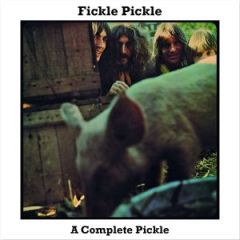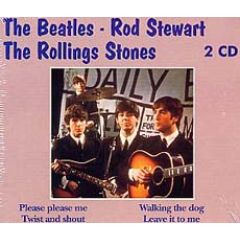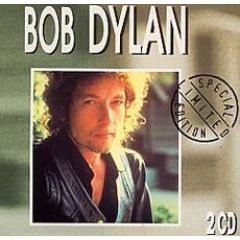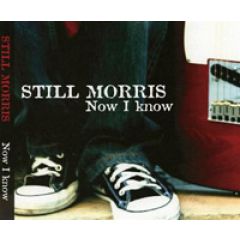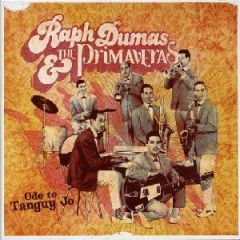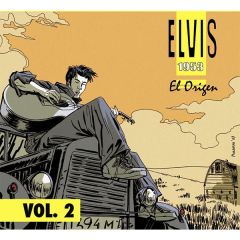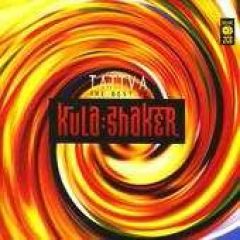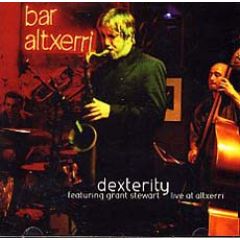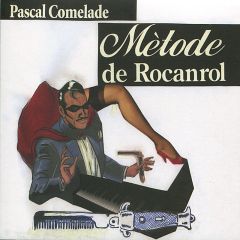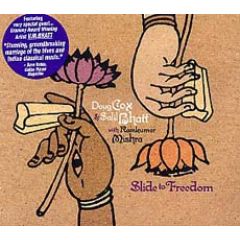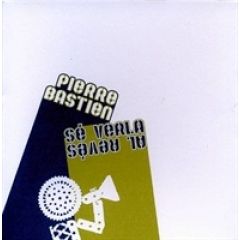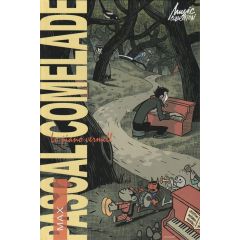FICHA PRODUCTO
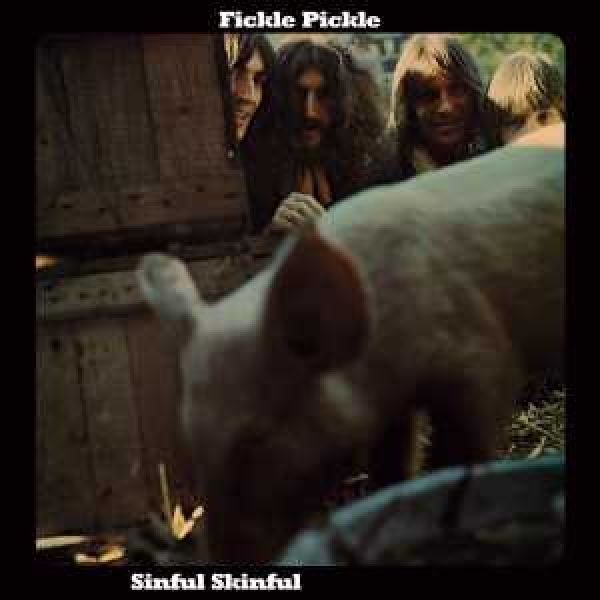
Sinful Skinful (LP + EP)
FICKLE PICKLE
LP
POP-ROCK
SECRET RECORDS (SECBT5015 01)
5036436112227
It’s always tempting to compensate for an artist’s commercial or critical obscurity by making outrageous claims on their behalf – an idea spoofed by self-deprecating album titles like Wizz Jones’s The Legendary Me and the TV Personalities’ They Could Have Been Bigger Than The Beatles. While nobody is suggesting that Fickle Pickle were ever likely to eclipse the Fab Four, they were certainly one of the more interesting acts operating in the early ’70s post-Beatles Britpop wasteland. Boasting four writers, singers and multi-instrumentalists who, between them, also handled production, engineering and arrangement duties, Fickle Pickle had the wit, cynicism, hooks, harmonies and technical dexterity to bridge the barren years between the demise of The Beatles and the eventual arrival in late 1972 of their kindred spirits 10cc.
As it turned out, Fickle Pickle did score a couple of hits in The Netherlands, and it was those minor successes that gave these studio-bound pop polymaths the impetus to assemble an entire album. Almost criminally, however, Sinful Skinful failed to gain a release outside of Holland – and, even then, only on a tiny independent label, Explosion. Sinful Skinful duly sold about seven-and-a-half copies before disappearing into the ether, and when follow-up singles also missed the mark, the members of Fickle Pickle vanished once more into the backroom, just another dropped stitch in the unknowable, unending tapestry of British pop.
Nearly half-a-century after the Dutch public had largely ignored its release, this first-ever vinyl reissue of the Sinful Skinful album is joined by a four-track EP that features a trio of non-LP single tracks from the era as well as the November 1970 outtake ‘Through The Days’ – the belated appearance of which will at least thrill its writer (and vocalist) Cliff Wade, whose McCartney impersonation on a cloning of ‘Maybe I’m Amazed’ went some way towards giving a largely non-existent outfit the chance to sire the album that you’re now holding in your impeccably manicured hand...
Fickle Pickle were based at Morgan Studios in Willesden, North London, an operation that had been assembled by failed-crooner-turned-independent-producer Monty Babson and his business partner, session drummer Barry Morgan. Babson surrounded himself at Morgan with familiar faces: in-house producer/writer Geoff Gill had been the drummer with exiled York beat/mod/psychedelic legends The Smoke, co-authoring their notorious ‘My Friend Jack’, while arranger and multi-instrumentalist Wil Malone was the creative force behind another of Babson’s hopefuls, harmony pop psychsters The Orange Bicycle.
The Morgan empire gradually expanded. Malone worked under a number of guises, including Barnaby Rudge, responsible for a one-off Cock-er-nee pub psych single cut in partnership with another of Babson’s favoured lieutenants and all-round studio whizz-kids, Fortes Mentum/Pussy member Danny Beckerman. Another Morgan minion was Cliff Wade, who’d vaguely known Geoff Gill from their days on the York beat circuit. When Wade’s own group ventures with The Roll Movement and Cucumber fizzled out, Geoff invited Cliff down to Morgan. Aided by Gill and Malone, Wade recorded a solo album, though only a solitary single, ‘You’ve Never Been To My House’, escaped before Babson closed down Morgan’s boutique record label and reverted to licensing masters to the majors. Unperturbed by these developments, Wade accepted Babson’s offer of employment at Morgan Studios as a music copier. “I used to have to transcribe every part of the orchestral arrangements – initially for a guy called Stan Butcher, then for Wil Malone – for each individual instrument”, he recalls. ‘Living in the studio’ was more than just a glib figure of speech for Cliff, incidentally – at night he dossed down on the studio floor!
Wade and Gill weren’t the only members of the Morgan mafia to have moseyed on down to Willesden from the killing fields of York. When Cliff called time on the Roll Movement, guitarist Steve Howden had moved on to Wellington Boot, who then morphed into blues-rock crew Red Dirt – who came to Morgan to record a self-titled, Gill-produced album that was licensed to Fontana. It didn’t sell.
By late 1969, Morgan Studios was teeming with bona fide pop and rock stars (Free, Led Zeppelin, the Kinks, Jethro Tull, Donovan, Rod Stewart, even Paul McCartney, who part-recorded his first solo set there while the Beatles were still officially together), while those who hadn’t quite reached the toppermost of the poppermost made the tea or hung around the tradesmen’s entrance – where they would have been greeted, incidentally, by another ex-Smoke member, Zeke Lund, employed by Monty as doorman.
In retrospect, it was inevitable that, with time on their hands and their own dreams of stardom still lingering, backroom workers like Geoff Gill, Wil Malone, Cliff Wade and Steve Howden would eventually pool their resources. Various permutations of this quartet had already collaborated on sundry low-key ventures but, in the autumn of 1969, they cut their first recording as an entity – Danny Beckerman’s ‘Sam And Sadie’. Surviving paperwork suggests that both this and another Beckerman song, ‘Green Mello Hill’, were recorded as Magic Worms (a typically daft psych-era handle), although Cliff Wade has no recollection of this name. ‘Green Mello Hill’, which featured Beckerman, Gill and Wade but apparently neither Malone nor Howden, was passed over to fellow York renegades Angel Pavement, who added their own vocals to the existing backing track. Meanwhile, ‘Sam And Sadie’ (backed by Malone’s ‘Millionaire’) was issued in January 1970 as the debut single by Fickle Pickle.
“Danny was always in search of hit singles”, recalls Cliff, who sang lead on the A-side. “He didn’t write specifically for us – ‘Sam And Sadie’ could have gone anywhere. His was the search for mainstream glory. I met Danny before I met Wil. He said to me, ‘Cliff, I think you’ll get on well with Wil – he does weird stuff like you!’”
The second Fickle Pickle A-side was, in truth, an irresistible marketing opportunity rather than a moment of high art. Paul McCartney had recently issued his debut solo album, but steadfastly declined to issue the standout track, ‘Maybe I’m Amazed’, as a single. It was too good an opportunity to turn down, and Fickle Pickle’s facsimile (backed by the cheeky ‘Sitting On A Goldmine’, featuring session man Johnny Van Derrick on violin) appeared in August 1970.
When that release stiffed, the group name was laid to rest for a while. Instead, the same nucleus of musicians released product as The Smoke, whose name was still felt to retain some cachet - particularly in Europe, where ‘My Friend Jack’ had been enormous. Former Smoke bassist Zeke Lund, who by now had progressed from doorman to studio engineer, was reunited with Geoff Gill for these sessions, with Wil Malone and Cliff Wade also implicated. Zeke, incidentally, engineered much of Fickle Pickle’s work. “He was our control room backbone, very much in tune with what we were doing”, recalls Cliff.
There was substantial overlap in the 1971-72 releases that were credited to either The Smoke or Fickle Pickle. ‘Sitting On A Goldmine’ and a Smoke B-side, ‘Guy Fawkes’, even utilised the same backing track – but then they were essentially the same musicians, singers, writers, arrangers and producers. Generally speaking, though, the recordings credited to Fickle Pickle tended to be more ambitious in terms of song construction, harmonies, production and arrangements, at the same time retaining a post-Beatles/Small Faces/Move/Kinks 60s ?berpop sheen. They also displayed a bizarre sense of humour, as is apparent on outtakes like ‘Sweet Wilfred – A Rodent Of Note’ and ‘Old Feet New Socks’.
Such recordings were, in fact, just the tip of the iceberg, as Cliff relates. “There are actually quite a few Fickle Pickle tracks missing in action, including ‘The Will’, a tender ballad about a dying man leaving the sky to his budgie etc., finishing with a rousing chorus about going down to the graveyard. We also recorded a cover of Stevie Wonder's ‘I Love Every Little Thing About You’, on which Wil did some sniffing noises as percussion without cracking his face once, while we all peed ourselves laughing! And then there was a song called ‘Jesus Christo’ (cover of an obscure Latin-pop number), a beautiful Bob Grimm (fellow Morgan act) composition called ‘Buena Vista’, also a song (mainly mine) called ‘Through The Days’ that had a great chorus...” Sadly the majority of these intriguing demos have yet to see the light of day, although the EP that accompanies this vinyl reissue does include the first-ever release of the missing-presumed-lost ‘Through The Days’, a classy little number that lives up to Cliff’s fond recollections of it.
In the midst of all this abortive activity, ‘Maybe I’m Amazed’ quietly and belatedly took off in Holland. In March 1971 it entered the Dutch national charts, spending a fortnight in the listings and peaking at the No 36 spot – not exactly an earth-shattering performance, but an unexpected fillip nonetheless.
Suitably encouraged, Fickle Pickle decided they’d better start taking things seriously – well, fairly seriously, anyway (“I've never laughed as much in my life as I did on some of Fickle's sessions”, Cliff admits). Clearly it was unreasonable to expect McCartney to keep writing world-class songs and leave them languishing on albums, so Gill and Malone penned ‘Let Me Tell You’, which kicked off as a delicate, lovelorn ballad before exploding into full-on raw rocker mode. Very similar to what Badfinger were doing, the song appeared solely in Holland as their latest A-side, but failed to have the same impact on the locals as ‘Maybe I’m Amazed’.
Undaunted, Fickle Pickle pulled out all the stops with Danny Beckerman’s typically commercial ‘California Calling’. A winsome vocal from Cliff was poured over a chorus hook, clumping piano, handclaps and sound effects that brought to mind ‘Hello Goodbye’, while a jazzy, Speakeasy-style trombone/trumpet arrangement recalled both ‘Your Mother Should Know’ and, more generally, the music hall fripperies that were occasionally evident in late Sixties British pop.
Once again road-tested in Holland, ‘California Calling’ did the trick, entering that country’s singles chart at the end of October 1971 and peaking at the No 26 position (on the flipside, incidentally, was the Gill/Malone duet ‘Blown Away’, facetiously described by the late Geoff Gill as “our version of Flanagan and Allen”). By this point, it was clear that the Dutch were pretty receptive to Fickle Pickle. Monty Babson duly encouraged the band to think in terms of an album – but preferably in studio downtime, lads, okay?
The result was Sinful Skinful, an album Cliff describes as “target practices… we didn’t reach as high as we aimed, but we must have been aiming pretty high.” A handful of the songs were either already or presently to be available in single format, but they weren’t necessarily the highlights. ‘Sandy’ was a song that Cliff had worked on for his aborted solo album, now afforded a more expansive backing track and production. ‘Barcelona’ was a vehicle for Steve Howden, occupying the same slightly tangential relationship to the rest of the album as Andy Hummel’s ‘The India Song’ had done on the first Big Star LP. The brain-fried surrealism of ‘Our Time Is Thru’, complete with unexpected, Pythonesque coda, was a suitable closing track, while the title track (which brazenly used the same Valerie/gallery rhyming couplet as ‘Maxwell’s Silver Hammer’), ‘Sunshine Pie’ and ‘Only For The Summer’ were lovely post-’60s pop rock creations, with irresistible choruses, intricate Beach Boys-style harmonies (something that Malone’s Orange Bicycle had majored in), unexpected melodic shifts and the same pothead sense of humour prevalent in much of The Smoke’s work.
The album also contained two songs that should have been heralded as stone cold classics. ‘Saturday’ was baroque pop perfection, boasting a cello backdrop that confirmed Malone had little equal as an arranger, while the ambitiously-structured ‘Down Smokey Lane’, which crossed late-period Beatles harmonies with the tongue-in-cheek humour of Ogden’s Nut Gone Flake, was little short of jaw-dropping. Some 47 years later, it’s shocking to think that two such magnificent creations should be restricted to an indie label, Dutch-only release. Shocking. (Cue insouciant whistling and sawing effects)
Released in a striking band-hides-sheepishly-behind-pig sleeve (which maybe held special significance for Howden, who’d previously worked as a pig castrator), Sinful Skinful failed to find the same level of support in The Netherlands as two of their singles – possibly because the hits had been handled either by Philips or leading Dutch label Negram, whereas Explosion were on their own with the album. Sadly, Explosion were too small to be able to give the album the support or budget that it deserved. “It was an awful pressing”, admits Cliff. “Grainy, incredibly clumsily edited, and obviously done on the cheap with very little expertise.”
The band needed another sure-fire hit, and Danny Beckerman – a man who probably has greater claim than anyone else to having been the fifth Pickle – seemed to have stumbled across a likely contender. While in America, he’d seen an unknown singer/songwriter by the name of Don McLean performing in a club. The highlight of McLean’s set had been a lengthy, allegorical song about Buddy Holly’s death and subsequent developments in international pop music. When Beckerman returned to London, he brought ‘American Pie’ back with him, and persuaded Fickle Pickle to quickly cut it before McLean’s label, UA, could get their act together.
They almost made it. Fickle Pickle’s version was released in the UK in January 1972, shortly after the original had entered the lower rungs of the US singles chart. However, McLean’s version was then rush-released in Britain, and Fickle Pickle were duly buried. And one has to say justice was done – this is definitely a case of, to borrow Dobie Gray’s phrase, the original still being the greatest. “Too rushed, too opportunistic”, is Cliff’s entirely accurate assessment now.
Beaten to the punch, ‘American Pie’ was quickly replaced in the UK singles racks by ‘California Calling’, finally given a release in the band’s homeland (it was also concurrently released in America on the Bell label). However, the original Dutch B-side, ‘Blown Away’, had been pressed into service on the flip of ‘American Pie’, and so the British release featured another track from the album, the riotous but relatively slight ‘Doctor Octopus’. Released in March 1972, ‘California Calling’ failed to make the grade in the UK – or, for that matter, in Italy or Sweden.
But Monty Babson thought he could squeeze further mileage from those couple of Dutch hits, and in early 1972 Fickle Pickle emerged out of the Willesden shadows to perform what Cliff recalls as “a hastily thrown-together tour of Holland – we even had roadies! We played quite a few dates, were interviewed on Dutch radio, and played live on another station. After some peremptory rehearsals in Morgan Studio Three, it was in at the deep end. No arenas, no rider - but it was a fun experience, apart from being driven at high speed through the fog to our Amsterdam hotel from one gig. Eddy was the driver's name – a large, friendly bear of a man from Dordrecht. He was our token tour manager. Some years later he called himself Danny Mirror and had a sizeable European hit single with ‘I Remember Elvis Presley’. Monty visited us for one gig in Amsterdam, and Danny Beckerman also came over for a few days before flying back to London to resume his never-ending quest for hit singles…”
Sadly the Holland jaunt was to prove Fickle Pickle’s final hurrah, although two further singles (both Dutch-only releases) would appear in their name. The first coupled ‘Just An Old Fashioned Love Song’ (lead vocal by Geoff Gill) with the Gill/Wade offering ‘Ask The People’ (Cliff on vox). The topside was a fine, Nilsson-esque version of a Paul Williams song that had been a US Top Five single in 1971 for Three Dog Night. Cliff, however, doesn’t really consider this release to be a part of the band’s oeuvre, as he now explains. “That coupling wasn’t really a Fickle Pickle thing, even though it was released as such. Like Danny Beckerman, Geoff was always on the lookout for a hit single by fair means or foul. After the Fickle Pickle dream had faded and we'd all been forced to move on, there was a period when Barry Morgan and Geoff Gill put their heads together. Barry had his directorship of Morgan and his session work (Elton John and many others), but wanted a stab at success as a record producer, and Geoff seemed to fancy some solo recording at the same time as chasing hit singles. That's how this recording came to be - I think I was musical arranger and session player. Another song produced by Barry for Geoff during this period was ‘I Need You’ (the ballad by America) for which I wrote the string arrangement & played guitars etc.”
The final vinyl credited to Fickle Pickle appeared later in 1972, and was a similar deal to the previous issue – a Geoff Gill-fronted cover version as the A-side, backed by a new Gill/Wade song on which Cliff took lead vocals and played everything bar the drums. Like its predecessor, ‘The Letter’ (not the Box Tops hit) and ‘Here And Now’ are dismissed by Cliff as “very routine session work, with none of the excitement and interplay of the early Fickle sessions”.
After ‘The Letter’, the Fickle Pickle brand name was retired and, as Cliff says, the individual musicians pursued other avenues. Wil Malone and Steve Howden drifted away from Morgan, but Geoff and Cliff continued to issue material as The Smoke, including bubblegum-cum-glam rock singles like ‘Shagalagalu’ and ‘My Lullaby’. They subsequently recorded together as The Beaver Brothers, and also worked with a Manchester band called Oscar and DJM hopeful Jenny Darren (Wil Malone also appeared on her recordings as a session musician). One of the songs they’d written for Darren, ‘Heartbreaker’, was then turned into an American hit by Pat Benatar. It subsequently featured in the US film Jawbreaker and was sampled by rapper Li’l Kim; even more impressively, it was immortalised in the sitcoms Seinfeld and King Of The Hill.
Malone and Beckerman, meanwhile, worked together on projects like the Intergalactic Touring Band before Wil hit the big time, arranging for (amongst others) the Who, Massive Attack, Paul Weller and The Verve. Beckerman – who sadly died in 2006 - also went on to do pretty well for himself, working with Rick Wakeman and Adam & The Ants and, by then based in Australia, penning material for the likes of teen diva Charlotte Church. Steve Howden also emigrated, moving to Los Angeles in 1978: he still plays in local bands.
All of which, of course, is a long, long way from Fickle Pickle’s adventures in a North London studio way back at the dawn of the Seventies. “The real strength of Fickle Pickle”, concludes Cliff, “was the respect, love and support we had for each other. It meant we had a pool of experience and resources which could have lead anywhere…”
“But here we are. Now…where were we…?”
DAVID WELLS
January 2018
As it turned out, Fickle Pickle did score a couple of hits in The Netherlands, and it was those minor successes that gave these studio-bound pop polymaths the impetus to assemble an entire album. Almost criminally, however, Sinful Skinful failed to gain a release outside of Holland – and, even then, only on a tiny independent label, Explosion. Sinful Skinful duly sold about seven-and-a-half copies before disappearing into the ether, and when follow-up singles also missed the mark, the members of Fickle Pickle vanished once more into the backroom, just another dropped stitch in the unknowable, unending tapestry of British pop.
Nearly half-a-century after the Dutch public had largely ignored its release, this first-ever vinyl reissue of the Sinful Skinful album is joined by a four-track EP that features a trio of non-LP single tracks from the era as well as the November 1970 outtake ‘Through The Days’ – the belated appearance of which will at least thrill its writer (and vocalist) Cliff Wade, whose McCartney impersonation on a cloning of ‘Maybe I’m Amazed’ went some way towards giving a largely non-existent outfit the chance to sire the album that you’re now holding in your impeccably manicured hand...
Fickle Pickle were based at Morgan Studios in Willesden, North London, an operation that had been assembled by failed-crooner-turned-independent-producer Monty Babson and his business partner, session drummer Barry Morgan. Babson surrounded himself at Morgan with familiar faces: in-house producer/writer Geoff Gill had been the drummer with exiled York beat/mod/psychedelic legends The Smoke, co-authoring their notorious ‘My Friend Jack’, while arranger and multi-instrumentalist Wil Malone was the creative force behind another of Babson’s hopefuls, harmony pop psychsters The Orange Bicycle.
The Morgan empire gradually expanded. Malone worked under a number of guises, including Barnaby Rudge, responsible for a one-off Cock-er-nee pub psych single cut in partnership with another of Babson’s favoured lieutenants and all-round studio whizz-kids, Fortes Mentum/Pussy member Danny Beckerman. Another Morgan minion was Cliff Wade, who’d vaguely known Geoff Gill from their days on the York beat circuit. When Wade’s own group ventures with The Roll Movement and Cucumber fizzled out, Geoff invited Cliff down to Morgan. Aided by Gill and Malone, Wade recorded a solo album, though only a solitary single, ‘You’ve Never Been To My House’, escaped before Babson closed down Morgan’s boutique record label and reverted to licensing masters to the majors. Unperturbed by these developments, Wade accepted Babson’s offer of employment at Morgan Studios as a music copier. “I used to have to transcribe every part of the orchestral arrangements – initially for a guy called Stan Butcher, then for Wil Malone – for each individual instrument”, he recalls. ‘Living in the studio’ was more than just a glib figure of speech for Cliff, incidentally – at night he dossed down on the studio floor!
Wade and Gill weren’t the only members of the Morgan mafia to have moseyed on down to Willesden from the killing fields of York. When Cliff called time on the Roll Movement, guitarist Steve Howden had moved on to Wellington Boot, who then morphed into blues-rock crew Red Dirt – who came to Morgan to record a self-titled, Gill-produced album that was licensed to Fontana. It didn’t sell.
By late 1969, Morgan Studios was teeming with bona fide pop and rock stars (Free, Led Zeppelin, the Kinks, Jethro Tull, Donovan, Rod Stewart, even Paul McCartney, who part-recorded his first solo set there while the Beatles were still officially together), while those who hadn’t quite reached the toppermost of the poppermost made the tea or hung around the tradesmen’s entrance – where they would have been greeted, incidentally, by another ex-Smoke member, Zeke Lund, employed by Monty as doorman.
In retrospect, it was inevitable that, with time on their hands and their own dreams of stardom still lingering, backroom workers like Geoff Gill, Wil Malone, Cliff Wade and Steve Howden would eventually pool their resources. Various permutations of this quartet had already collaborated on sundry low-key ventures but, in the autumn of 1969, they cut their first recording as an entity – Danny Beckerman’s ‘Sam And Sadie’. Surviving paperwork suggests that both this and another Beckerman song, ‘Green Mello Hill’, were recorded as Magic Worms (a typically daft psych-era handle), although Cliff Wade has no recollection of this name. ‘Green Mello Hill’, which featured Beckerman, Gill and Wade but apparently neither Malone nor Howden, was passed over to fellow York renegades Angel Pavement, who added their own vocals to the existing backing track. Meanwhile, ‘Sam And Sadie’ (backed by Malone’s ‘Millionaire’) was issued in January 1970 as the debut single by Fickle Pickle.
“Danny was always in search of hit singles”, recalls Cliff, who sang lead on the A-side. “He didn’t write specifically for us – ‘Sam And Sadie’ could have gone anywhere. His was the search for mainstream glory. I met Danny before I met Wil. He said to me, ‘Cliff, I think you’ll get on well with Wil – he does weird stuff like you!’”
The second Fickle Pickle A-side was, in truth, an irresistible marketing opportunity rather than a moment of high art. Paul McCartney had recently issued his debut solo album, but steadfastly declined to issue the standout track, ‘Maybe I’m Amazed’, as a single. It was too good an opportunity to turn down, and Fickle Pickle’s facsimile (backed by the cheeky ‘Sitting On A Goldmine’, featuring session man Johnny Van Derrick on violin) appeared in August 1970.
When that release stiffed, the group name was laid to rest for a while. Instead, the same nucleus of musicians released product as The Smoke, whose name was still felt to retain some cachet - particularly in Europe, where ‘My Friend Jack’ had been enormous. Former Smoke bassist Zeke Lund, who by now had progressed from doorman to studio engineer, was reunited with Geoff Gill for these sessions, with Wil Malone and Cliff Wade also implicated. Zeke, incidentally, engineered much of Fickle Pickle’s work. “He was our control room backbone, very much in tune with what we were doing”, recalls Cliff.
There was substantial overlap in the 1971-72 releases that were credited to either The Smoke or Fickle Pickle. ‘Sitting On A Goldmine’ and a Smoke B-side, ‘Guy Fawkes’, even utilised the same backing track – but then they were essentially the same musicians, singers, writers, arrangers and producers. Generally speaking, though, the recordings credited to Fickle Pickle tended to be more ambitious in terms of song construction, harmonies, production and arrangements, at the same time retaining a post-Beatles/Small Faces/Move/Kinks 60s ?berpop sheen. They also displayed a bizarre sense of humour, as is apparent on outtakes like ‘Sweet Wilfred – A Rodent Of Note’ and ‘Old Feet New Socks’.
Such recordings were, in fact, just the tip of the iceberg, as Cliff relates. “There are actually quite a few Fickle Pickle tracks missing in action, including ‘The Will’, a tender ballad about a dying man leaving the sky to his budgie etc., finishing with a rousing chorus about going down to the graveyard. We also recorded a cover of Stevie Wonder's ‘I Love Every Little Thing About You’, on which Wil did some sniffing noises as percussion without cracking his face once, while we all peed ourselves laughing! And then there was a song called ‘Jesus Christo’ (cover of an obscure Latin-pop number), a beautiful Bob Grimm (fellow Morgan act) composition called ‘Buena Vista’, also a song (mainly mine) called ‘Through The Days’ that had a great chorus...” Sadly the majority of these intriguing demos have yet to see the light of day, although the EP that accompanies this vinyl reissue does include the first-ever release of the missing-presumed-lost ‘Through The Days’, a classy little number that lives up to Cliff’s fond recollections of it.
In the midst of all this abortive activity, ‘Maybe I’m Amazed’ quietly and belatedly took off in Holland. In March 1971 it entered the Dutch national charts, spending a fortnight in the listings and peaking at the No 36 spot – not exactly an earth-shattering performance, but an unexpected fillip nonetheless.
Suitably encouraged, Fickle Pickle decided they’d better start taking things seriously – well, fairly seriously, anyway (“I've never laughed as much in my life as I did on some of Fickle's sessions”, Cliff admits). Clearly it was unreasonable to expect McCartney to keep writing world-class songs and leave them languishing on albums, so Gill and Malone penned ‘Let Me Tell You’, which kicked off as a delicate, lovelorn ballad before exploding into full-on raw rocker mode. Very similar to what Badfinger were doing, the song appeared solely in Holland as their latest A-side, but failed to have the same impact on the locals as ‘Maybe I’m Amazed’.
Undaunted, Fickle Pickle pulled out all the stops with Danny Beckerman’s typically commercial ‘California Calling’. A winsome vocal from Cliff was poured over a chorus hook, clumping piano, handclaps and sound effects that brought to mind ‘Hello Goodbye’, while a jazzy, Speakeasy-style trombone/trumpet arrangement recalled both ‘Your Mother Should Know’ and, more generally, the music hall fripperies that were occasionally evident in late Sixties British pop.
Once again road-tested in Holland, ‘California Calling’ did the trick, entering that country’s singles chart at the end of October 1971 and peaking at the No 26 position (on the flipside, incidentally, was the Gill/Malone duet ‘Blown Away’, facetiously described by the late Geoff Gill as “our version of Flanagan and Allen”). By this point, it was clear that the Dutch were pretty receptive to Fickle Pickle. Monty Babson duly encouraged the band to think in terms of an album – but preferably in studio downtime, lads, okay?
The result was Sinful Skinful, an album Cliff describes as “target practices… we didn’t reach as high as we aimed, but we must have been aiming pretty high.” A handful of the songs were either already or presently to be available in single format, but they weren’t necessarily the highlights. ‘Sandy’ was a song that Cliff had worked on for his aborted solo album, now afforded a more expansive backing track and production. ‘Barcelona’ was a vehicle for Steve Howden, occupying the same slightly tangential relationship to the rest of the album as Andy Hummel’s ‘The India Song’ had done on the first Big Star LP. The brain-fried surrealism of ‘Our Time Is Thru’, complete with unexpected, Pythonesque coda, was a suitable closing track, while the title track (which brazenly used the same Valerie/gallery rhyming couplet as ‘Maxwell’s Silver Hammer’), ‘Sunshine Pie’ and ‘Only For The Summer’ were lovely post-’60s pop rock creations, with irresistible choruses, intricate Beach Boys-style harmonies (something that Malone’s Orange Bicycle had majored in), unexpected melodic shifts and the same pothead sense of humour prevalent in much of The Smoke’s work.
The album also contained two songs that should have been heralded as stone cold classics. ‘Saturday’ was baroque pop perfection, boasting a cello backdrop that confirmed Malone had little equal as an arranger, while the ambitiously-structured ‘Down Smokey Lane’, which crossed late-period Beatles harmonies with the tongue-in-cheek humour of Ogden’s Nut Gone Flake, was little short of jaw-dropping. Some 47 years later, it’s shocking to think that two such magnificent creations should be restricted to an indie label, Dutch-only release. Shocking. (Cue insouciant whistling and sawing effects)
Released in a striking band-hides-sheepishly-behind-pig sleeve (which maybe held special significance for Howden, who’d previously worked as a pig castrator), Sinful Skinful failed to find the same level of support in The Netherlands as two of their singles – possibly because the hits had been handled either by Philips or leading Dutch label Negram, whereas Explosion were on their own with the album. Sadly, Explosion were too small to be able to give the album the support or budget that it deserved. “It was an awful pressing”, admits Cliff. “Grainy, incredibly clumsily edited, and obviously done on the cheap with very little expertise.”
The band needed another sure-fire hit, and Danny Beckerman – a man who probably has greater claim than anyone else to having been the fifth Pickle – seemed to have stumbled across a likely contender. While in America, he’d seen an unknown singer/songwriter by the name of Don McLean performing in a club. The highlight of McLean’s set had been a lengthy, allegorical song about Buddy Holly’s death and subsequent developments in international pop music. When Beckerman returned to London, he brought ‘American Pie’ back with him, and persuaded Fickle Pickle to quickly cut it before McLean’s label, UA, could get their act together.
They almost made it. Fickle Pickle’s version was released in the UK in January 1972, shortly after the original had entered the lower rungs of the US singles chart. However, McLean’s version was then rush-released in Britain, and Fickle Pickle were duly buried. And one has to say justice was done – this is definitely a case of, to borrow Dobie Gray’s phrase, the original still being the greatest. “Too rushed, too opportunistic”, is Cliff’s entirely accurate assessment now.
Beaten to the punch, ‘American Pie’ was quickly replaced in the UK singles racks by ‘California Calling’, finally given a release in the band’s homeland (it was also concurrently released in America on the Bell label). However, the original Dutch B-side, ‘Blown Away’, had been pressed into service on the flip of ‘American Pie’, and so the British release featured another track from the album, the riotous but relatively slight ‘Doctor Octopus’. Released in March 1972, ‘California Calling’ failed to make the grade in the UK – or, for that matter, in Italy or Sweden.
But Monty Babson thought he could squeeze further mileage from those couple of Dutch hits, and in early 1972 Fickle Pickle emerged out of the Willesden shadows to perform what Cliff recalls as “a hastily thrown-together tour of Holland – we even had roadies! We played quite a few dates, were interviewed on Dutch radio, and played live on another station. After some peremptory rehearsals in Morgan Studio Three, it was in at the deep end. No arenas, no rider - but it was a fun experience, apart from being driven at high speed through the fog to our Amsterdam hotel from one gig. Eddy was the driver's name – a large, friendly bear of a man from Dordrecht. He was our token tour manager. Some years later he called himself Danny Mirror and had a sizeable European hit single with ‘I Remember Elvis Presley’. Monty visited us for one gig in Amsterdam, and Danny Beckerman also came over for a few days before flying back to London to resume his never-ending quest for hit singles…”
Sadly the Holland jaunt was to prove Fickle Pickle’s final hurrah, although two further singles (both Dutch-only releases) would appear in their name. The first coupled ‘Just An Old Fashioned Love Song’ (lead vocal by Geoff Gill) with the Gill/Wade offering ‘Ask The People’ (Cliff on vox). The topside was a fine, Nilsson-esque version of a Paul Williams song that had been a US Top Five single in 1971 for Three Dog Night. Cliff, however, doesn’t really consider this release to be a part of the band’s oeuvre, as he now explains. “That coupling wasn’t really a Fickle Pickle thing, even though it was released as such. Like Danny Beckerman, Geoff was always on the lookout for a hit single by fair means or foul. After the Fickle Pickle dream had faded and we'd all been forced to move on, there was a period when Barry Morgan and Geoff Gill put their heads together. Barry had his directorship of Morgan and his session work (Elton John and many others), but wanted a stab at success as a record producer, and Geoff seemed to fancy some solo recording at the same time as chasing hit singles. That's how this recording came to be - I think I was musical arranger and session player. Another song produced by Barry for Geoff during this period was ‘I Need You’ (the ballad by America) for which I wrote the string arrangement & played guitars etc.”
The final vinyl credited to Fickle Pickle appeared later in 1972, and was a similar deal to the previous issue – a Geoff Gill-fronted cover version as the A-side, backed by a new Gill/Wade song on which Cliff took lead vocals and played everything bar the drums. Like its predecessor, ‘The Letter’ (not the Box Tops hit) and ‘Here And Now’ are dismissed by Cliff as “very routine session work, with none of the excitement and interplay of the early Fickle sessions”.
After ‘The Letter’, the Fickle Pickle brand name was retired and, as Cliff says, the individual musicians pursued other avenues. Wil Malone and Steve Howden drifted away from Morgan, but Geoff and Cliff continued to issue material as The Smoke, including bubblegum-cum-glam rock singles like ‘Shagalagalu’ and ‘My Lullaby’. They subsequently recorded together as The Beaver Brothers, and also worked with a Manchester band called Oscar and DJM hopeful Jenny Darren (Wil Malone also appeared on her recordings as a session musician). One of the songs they’d written for Darren, ‘Heartbreaker’, was then turned into an American hit by Pat Benatar. It subsequently featured in the US film Jawbreaker and was sampled by rapper Li’l Kim; even more impressively, it was immortalised in the sitcoms Seinfeld and King Of The Hill.
Malone and Beckerman, meanwhile, worked together on projects like the Intergalactic Touring Band before Wil hit the big time, arranging for (amongst others) the Who, Massive Attack, Paul Weller and The Verve. Beckerman – who sadly died in 2006 - also went on to do pretty well for himself, working with Rick Wakeman and Adam & The Ants and, by then based in Australia, penning material for the likes of teen diva Charlotte Church. Steve Howden also emigrated, moving to Los Angeles in 1978: he still plays in local bands.
All of which, of course, is a long, long way from Fickle Pickle’s adventures in a North London studio way back at the dawn of the Seventies. “The real strength of Fickle Pickle”, concludes Cliff, “was the respect, love and support we had for each other. It meant we had a pool of experience and resources which could have lead anywhere…”
“But here we are. Now…where were we…?”
DAVID WELLS
January 2018
RELATED PRODUCTS
